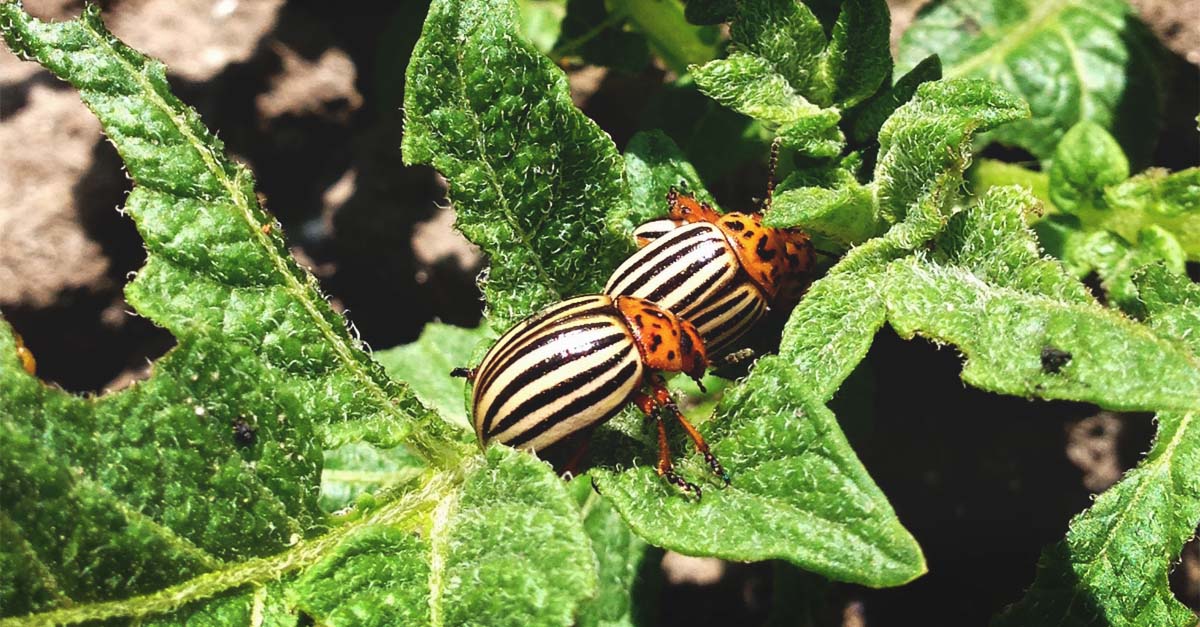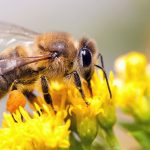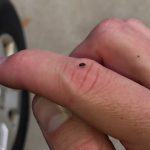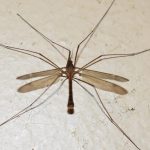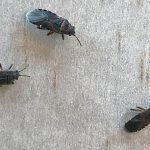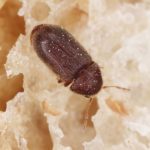Are you tired of watching your potato plants devoured by pesky Colorado potato beetles, also known as potato bugs?
These tiny insects can wreak havoc on your garden and cause significant damage to your crops. But fear not.
It’s time to take matters into your own hands and get rid of these pests naturally. This article will explore some of the most effective and eco-friendly ways to eliminate potato bugs without relying on harsh chemicals that can harm the environment and your precious plants.
Our simple guidelines allow you to protect your garden and enjoy a thriving potato harvest. We’ll delve into tried-and-true methods such as diatomaceous earth, companion planting, and homemade insecticidal sprays.
Additionally, we’ll provide preventative measures to discourage these bugs from infesting your beloved potato plants in the first place. Following our advice, you can safeguard your potato plants and reap a bountiful harvest without worrying about invasive pests.
So, let’s get started.
What Are Potato Bugs?
Contents
These pests, also known as Colorado potato beetles, are common and destructive insects that can cause significant damage to potato plants and other nightshade family members.
Measuring about half an inch long, they have a hard outer shell and distinctive yellow and black stripes that make them easy to identify. Native to North America, potato bugs were first discovered in Colorado in the mid-1800s.
Since then, they have spread throughout the United States and other parts of the world, including Asia and Europe. They reproduce quickly, laying their eggs on the undersides of leaves, and their larvae feed on plant leaves and stems.
If left unchecked, a potato bug infestation can cause significant damage to crops and reduce yields. Potato bugs are particularly attracted to potatoes but feast on other nightshades such as tomatoes, eggplants, and peppers.
So, what can you do to get rid of them? While chemical pesticides can effectively control potato bugs, many prefer natural methods.
One alternative is companion planting. Due to their strong odors, certain aromatic herbs like marigolds and mint repel potato bugs.
Planting them near your potatoes can help deter these pests from infesting your plants. Handpicking is another common method of killing potato bugs, but it can be time-consuming for large gardens or fields.
In addition, these bugs have a tough outer shell, making them difficult to crush. Neem oil is an effective natural pesticide derived from the neem tree that can be found at most garden centers.
Dilute according to package instructions and apply it to your potato plants with a sprayer or watering can. Repeat this treatment every week until the bugs are gone.
Diatomaceous earth is another alternative made from the fossilized remains of tiny aquatic animals available at most garden centers. Sprinkle it around the base of your potato plants and on the leaves.
The powder will stick to the potato bugs and dehydrate them, eventually causing them to die.
To prevent a buildup of pests in the soil, rotate your crops each year and ensure good garden hygiene by regularly inspecting your plants for signs of disease and removing any affected leaves or plants immediately.
Potato bugs may be a common pest, but with natural remedies such as companion planting, neem oil, and diatomaceous earth, you can protect your plants from significant damage.
Natural Solutions to Get Rid of Potato Bugs
There’s no need to fret because we’ve got some natural solutions to help you get rid of these pesky pests safely and effectively.
The first and most effective way to get rid of potato bugs is to handpick them off the plants.
Although it may be time-consuming, it’s a natural and safe way to keep the bugs at bay.
Another popular natural remedy is neem oil. This natural pesticide can repel potato bugs when mixed with a gallon of water and sprayed on the plants.
If you want a safer option, garlic spray is another excellent choice. Garlic contains sulfur compounds that are toxic to potato bugs.
Crush ten garlic cloves and mix them with a quart of water. Let the mixture sit overnight, strain it into a spray bottle, then apply it to your plants. Diatomaceous earth is also an excellent natural insecticide that can be used to repel potato bugs.
Sprinkle it around the base of your plants to create a barrier that will keep these pests at bay. Planting certain plants, such as marigolds and radishes, alongside your potatoes can also help repel potato bugs naturally.
Using these natural solutions, you can eliminate potato bugs without resorting to harmful chemicals.
Using Neem Oil to Get Rid of Potato Bugs
We have a natural solution for you – neem oil.
Derived from the seeds of the neem tree, which is native to India, neem oil is a powerful insecticide that disrupts the feeding and reproductive patterns of insects. This makes it an effective natural pesticide to get rid of potato bugs.
Using neem oil is simple. Mix 1-2 tablespoons of neem oil with a gallon of water and pour it into a spray bottle.
Spray the mixture directly onto your potato plants, ensuring that the leaves’ tops and bottoms are coated. Repeat this process every 7-10 days until the potato bugs disappear entirely.
But wait, there’s more. While neem oil is an eco-friendly alternative to chemical pesticides, it can also harm beneficial insects.
Additionally, avoid applying neem oil on plants in direct sunlight or when temperatures exceed 90 degrees Fahrenheit to prevent damage to your plants.
Using Diatomaceous Earth to Get Rid of Potato Bugs
A natural and effective solution can save your plants: diatomaceous earth. Made from the fossilized remains of tiny aquatic organisms called diatoms, this powdery substance acts like a superhero sidekick to combat those pesky bugs.
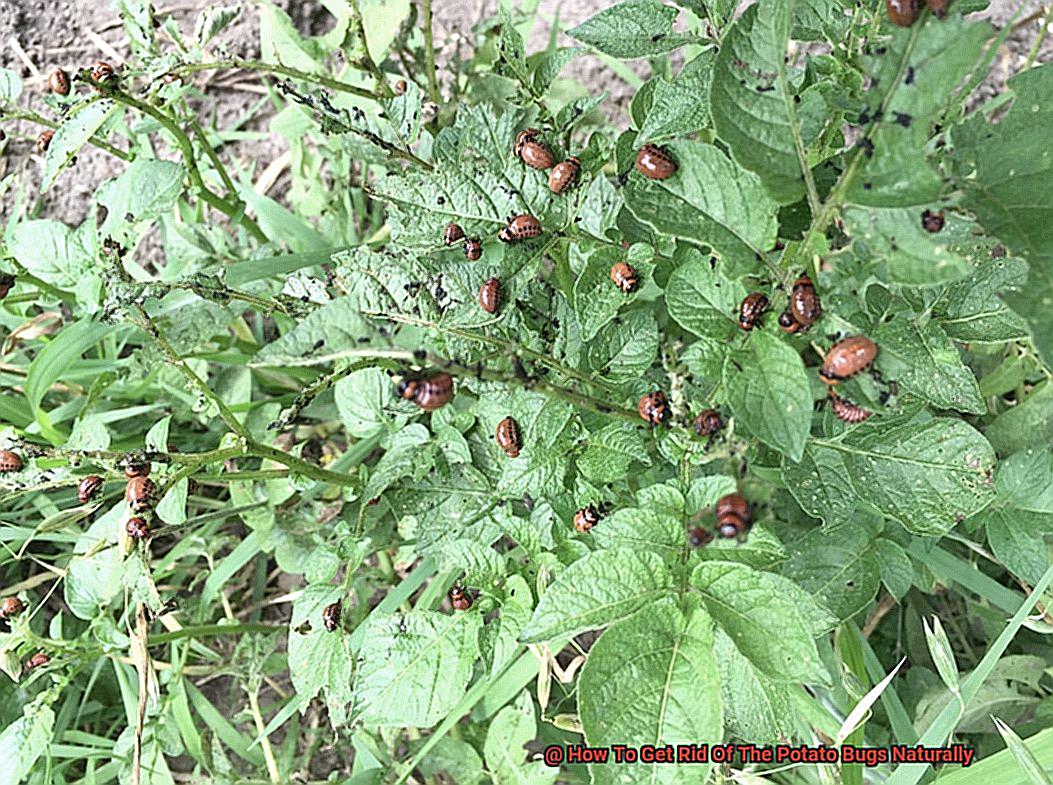
When potato bugs encounter diatomaceous earth, their exoskeletons are dehydrated, leading to their demise. It’s like Batman trapping the Riddler – diatomaceous earth is the ultimate weapon against potato bugs.
To use diatomaceous earth, sprinkle a thin layer around the base of your plants or on the leaves where the bugs are present. But be careful.
This powder can irritate your skin and lungs, so wear gloves and a mask. And remember to reapply after watering or raining to maintain its effectiveness.
Unlike chemical insecticides, one of the main benefits of using diatomaceous earth is that it won’t harm beneficial insects such as bees or ladybugs. It’s an organic alternative that won’t pollute your garden with harmful chemicals.
However, remember that it only works when dry – if it gets wet, its functionality is lost. In conclusion, diatomaceous earth is a garden superhero that can help you get rid of potato bugs naturally and effectively.
Companion Planting to Deter Potato Bugs
Companion planting is a natural and effective way to deter potato bugs. By planting certain plants alongside your potatoes, you can naturally repel the pests that are attracted to them.
Not only does this method discourage rodents, but it also attracts beneficial insects and improves soil quality. Marigolds, catnip, and garlic are the key companions for deterring potato bugs.
Marigolds are like companion plant superheroes. They produce a strong scent that potato bugs dislike.
Plant marigolds around the perimeter of your potato patch or between rows of potatoes for maximum effectiveness.
They’re also easy to grow and come in various colors, so you can add a pop of color to your garden while protecting your potatoes. Catnip is not just for feline friends; it’s also an excellent pest repellent.
The strong scent of catnip is known to repel various pests, including potato bugs. Plant catnip around the perimeter of your garden or in between rows of potatoes to keep the bugs at bay.
Plus, it’s a natural stress reliever for cats.
Garlic is not only delicious but also an effective natural pest killer. The strong scent of garlic deters various pests, making it an excellent natural pest control option.
Plant garlic cloves around your potato patch or between rows of potatoes to naturally repel the pests. But wait, there’s more.
Certain types of plants attract beneficial insects that prey on potato bugs. Dill, coriander, and yarrow are just a few examples.
By planting these plants alongside your potatoes, you can attract natural predators that will help keep the potato bug population in check.
So, companion planting is an effective and natural way to deter potato bugs from your garden.
Practicing Good Garden Hygiene
Maintaining a healthy and thriving garden requires more than just planting and watering; it also involves keeping it clean and tidy.
Potato bugs thrive in damp and dirty environments, making it essential to keep your garden bed free of debris and dead plants. Doing this can eliminate potential hiding places for potato bugs and other pests that can wreak havoc on your garden.
Another crucial aspect of maintaining good garden hygiene is crop rotation. Potato bugs lay their eggs in the soil, so rotating your crops annually disrupts their life cycle and prevents them from establishing a consistent food source.
Removing diseased or damaged plants is vital in keeping potato bugs and other pests at bay. These plants can attract unwanted visitors to your garden, just like a dirty plate attracts ants.
Disposing of them adequately can prevent an infestation from taking hold. If you experience a potato bug infestation, avoid composting affected plants, as this can further spread the infestation.
It’s like isolating sick family members to prevent others from getting sick. Finally, proper watering techniques prevent a damp environment that potato bugs love.
Avoid over-watering and try not to get water on the leaves when possible. In conclusion, practicing good garden hygiene is essential in preventing potato bug infestations and maintaining a healthy and flourishing garden.
Conclusion
In conclusion, ridding your garden of pesky potato bugs naturally is possible and eco-friendly.
These critters can cause significant damage to your beloved potato plants and other members of the nightshade family. Still, with the right equipment and techniques, you can keep them at bay without resorting to harmful chemicals. You’re in luck if you’re looking for natural remedies to eliminate potato bugs.
Handpicking is a tried-and-true method that manually removes pests from your plants.
Companion planting is another effective way to discourage potato bugs by planting certain plants that naturally repel them alongside your potatoes.
Neem oil, garlic spray, and diatomaceous earth are popular natural remedies that help keep these pests away. But it’s not just about getting rid of the bugs – maintaining good garden hygiene is crucial, too.
By removing rubble, rotating crops, removing diseased plants, avoiding composting affected plants, and using proper irrigation methods, you can prevent infestations and maintain a healthy and flourishing garden. So don’t let pesky potato bugs ruin your gardening dreams.

